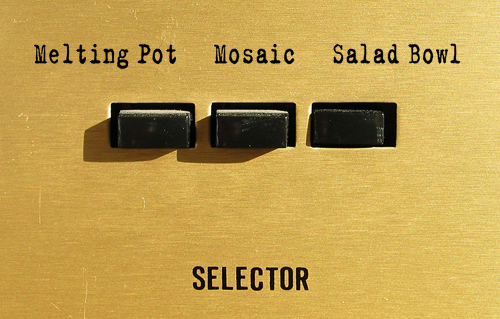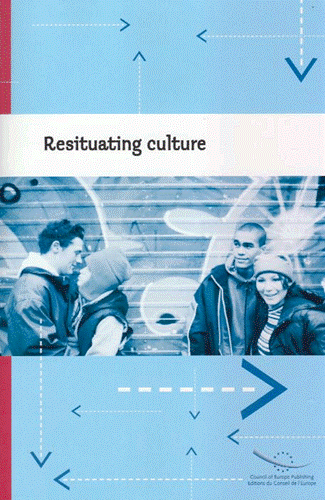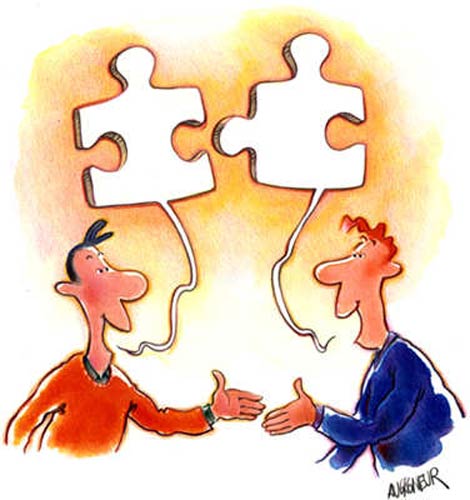In his article «A White Paper on what?», Bastian Küntzel looked into intercultural dialogue and asked whether it is a solution, a problem, or mission impossible. In November 2006, international non-governmental organisations teamed up with local youth workers from Alsace and Baden to look at these questions — and many more — in their «Forum on Intercultural Dialogue».
Based on the work of the forum, a discussion document has now been produced by Andreas Karsten and Bastian Küntzel that has received great interest from the INGO Assembly of the Council of Europe, the convener of the forum.
contribution….
In their first 2007 meeting, the representatives of civil society considered the document to be one of their prime contributions to the discussions of the Council of Europe on the White Paper on Intercultural Dialogue. But even beyond the context of the white paper, the text has something to offer for other discourses as well — not the least in relation to the European Union’s «Year of Intercultural Dialogue» in 2008.
Be warned that the INGO’s discussion document possibly is, in some ways, an unusual document — it was written by a general rapporteur with the invitation to be subjectively opiniated and critically reflective and is meant to be more of a recollection of ideas and discussions than a typical report. With that approach, it aims to bring together the thinking and ideas that lead to the forum with the experiences expressed and discussions held at the forum itself.
The paper looks at culture and dialogue, at intercultural dialogue, at anti-racism and at intercultural learning. It criticises the limited approach of the Council of Europe’s White Paper in seeing culture merely to
«include everything relating to ways of life, customs, beliefs and other things that have been passed on to us for generations, as well as the various forms of artistic creations,»
a perspective which ignores that culture not only determines who we are, but also how we judge others. Because of that, the notion of culture has well disguised, yet highly political implications. The paper argues that
«the notion of culture can therefore not only be considered as ‘our different ways of life’, but also has to entail the varying and often biased modes of framing and assessing these ways of living.»

The document also presents, among other things, a range of suggestions (based on the forum’s participants’ experience from practice) how intercultural dialogue needs to be conditioned to be successful.
Going beyond that, the text also identifies some questions for further discussion in the spirit of Jostein Gaarder, who said once that
«an answer is always the part of the road that is behind you; only questions point to the future.»
These questions, which are meant as the paper’s contribution to the discussion on intercultural dialogue which is only just beginning, we share with you here for thinking and discussion:
- Is dialogue enough to evolve from multi-cultural co-existence to intercultural co-production?
- Are discrimination and racism only a question of culture? Would such a claim not delude questions of power, power relations and structural issues?
- Does the current practice of intercultural learning support such delusion? Are we the fog of racism revealed by speaking of culture?
- Is the use of the notion ‘intercultural dialogue’ and in particular the connotations of the concepts of ‘culture’ so problematic that one should disengage and withdraw from this dialogue altogether?
- How could we reclaim the terms — if at all?
- What can we do to bridge the gap between community work and mainstream public discourses on intercultural dialogue?
- How can we bring together conceptual, educational, political discourses and controversies on intercultural dialogue — on all levels; practice, policy, media and academia?
- How can the imminent culturalisation of minorities be broken up — also in our own educational, political and/or scientific work?
- How is it possible to engage in intercultural dialogue and avoid cultural relativism? Is it possible at all?
- What are the limits of local level intercultural dialogue, and what are the limits of a European approach? How can local and international levels be brought together best, i.e. in complementary and informing ways?

To read further about all sorts of issues related to culture and intercultural dialogue, the Council of Europe’s book «Resituating Culture» may be a good starting point. It is currently out of print in the Council’s bookstore, but you can download the pdf-version (1.3 MB) here.
«The important thing is not to stop questioning. Curiosity has its own reasons for existing.Albert Einstein»
